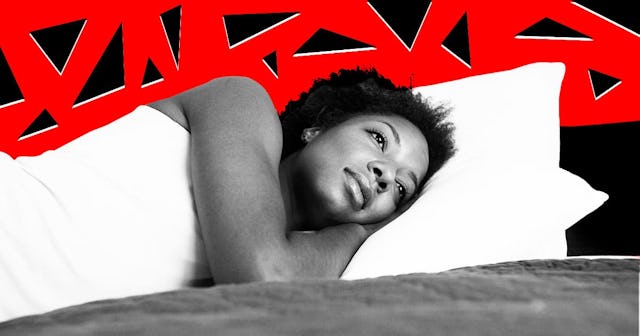The Cause Of Chronic Pain Might Be Up For Debate But Its Impact Isn't

In June 2018, at just 24 years old, a disc in my cervical spine herniated backwards causing a severe compression of my spinal cord and two of my vertebrae to become bone-on-bone. By the time I was diagnosed, the damage to my spinal cord was too extensive and surgery was my only option to avoid paralysis. This was a year and a half ago, and ever since my operation, I’ve lived with chronic pain every single day… despite being told by my nurses that I would “bounce back in no time.”
The surgeon who preformed my surgery became quickly irritated with my ongoing pain post-op. After four months of complaints, following a major surgery with a minimum six-month recovery, I was told by my surgeon that he’d done all he could. Soon after, he suggested that I see a different surgeon and pain management.
In non-medical terms, he got sick of me. He had “needier” patients, and I was on the bottom of his priority list when it came to attempting to figure out my persistent and debilitating pain. To put my emotions plainly, it felt like I’d been hacked into, dropped, and left alone to suffer.
Ana Labate/FreeImages
My spine hasn’t healed at the expected rate for the average person. But just this past month, I was told by my new surgeon that my spine is beginning to show signs of healing. You’d think I’d leap for joy at that long-awaited news, but I didn’t.
Actually, I cried. Because it is difficult to feel relief in a good scan when your pain is so damn consistent.
Of course, I was thrilled my spine was becoming more stable. But at the same time, I was so damn frustrated to have yet another question mark added to my daily pain. Because “sorry you’re in pain, but your scans look fine” isn’t cutting it for me anymore. I want answers, but there are little to none.
Living with chronic pain in today’s world leaves me screaming into the void.
Because the ugly truth is that we don’t understand chronic pain. And it’s yet to be determined why some people are more susceptible to this physical hold than others.
Some doctors think that emotional trauma, isolation, depression and anxiety can leave patients at an increased risk for chronic pain, while others believe it can be due to an underlying disease. Nerves are slow to regenerate, so in my case, chronic nerve damage and inflammation is a likely cause for my pain, as well as many other chronic pain patients post-injury and illness.
Alex Boyd/Unsplash
But the fact remains: we still don’t fully understand what causes chronic pain.
To this day, there aren’t many effective medicines that help ease the burden of severe pain swiftly, except for narcotics. But due to the opioid crisis that we are living in, and the reduction in opioid prescriptions, it’s chronic pain patients who suffer. They are — we are — the “other side” of this opioid epidemic if you will.
Some doctors think that emotional trauma, isolation, depression and anxiety can leave patients at an increased risk for chronic pain, while others believe it can be due to an underlying disease.
A few months after my surgery, within a matter of one week, my opioid medication was cut by 2/3. What used to get me through the morning was now supposed to last me for the entire day. Not only did this exacerbate the physical pain I was already feeling, it also spun me into a poor mental state of being.
For the first time in many years, I was suicidal. I was withdrawing when I shouldn’t have been. But worst of all? I felt like I was being punished for still expressing my very real pain.
But just because there are no definitive precursors, no causes, and no clear-cut medications to ease the hurt, does not mean that the 50 million Americans like me should be dismissed or ignored.
This doesn’t make someone’s symptoms magically go away… it just makes them feel unheard.
Living with chronic pain in today’s world leaves me screaming into the void. On one hand, I can’t get my insurance to cooperate with me. On the other, I can’t get my surgeons to sit down with me long enough to fully listen to me. My nurses give me dirty looks, something that has never happened to me until my injury caused my chronic pain. Pharmacists are hesitant when filling my opioid prescriptions.
Ana Labate/FreeImages
Nobody dares to say it, but I will. This mistreatment of chronic pain patients feels an awful lot like mistrust.
But whether I am believed or not, the severity of my symptoms do not vanish. There are days when I can’t hold my phone to my ear due to the weakness and pain. I struggle to fasten buttons, open cans and bottles, and perform day-to-day activities. I don’t have the mobility that I used to, and my overall quality of life has been dramatically decreased.
I used to take my kids out and about to do all-of-the-things. But because I can’t be as active as I once was, now I don’t. And as a result, I’ve gained 70 lbs. in a year and a half. My anxiety and depression from the injury and uncertainty of my pain comes and goes. And when I’m passed around by my doctors, until it results in a full circle, my mental state crumbles even more.
The root of all chronic pain matters, but we’ve yet to figure that mystery out. So in the meantime, I need the world to see the impact of this physical hurt. Because ignoring chronic pain is only making patients’ symptoms worse.
This article was originally published on